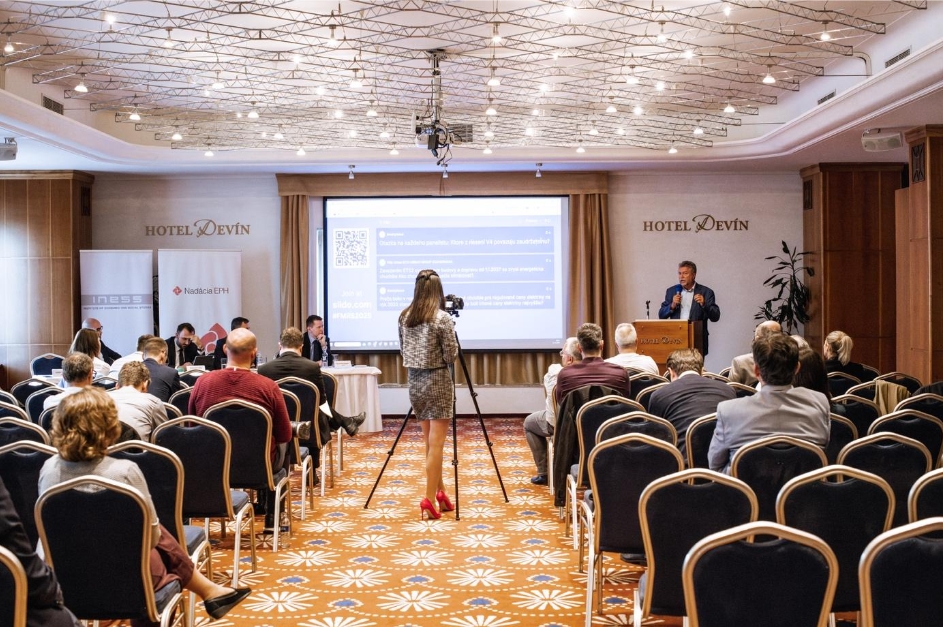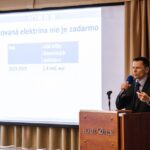INESS once again organized the popular conference in cooperation with the Austrian Economics Center as part of the international conference network Free Market Road Show.
On May 14, 2025 we were honoured to welcome both local and international speakers as well as almost 50 guests in the hall of the Devín Hotel in Bratislava. The topic was Targeted energy aid to households, how it should be set up and how energy poverty should be defined.
The conference was supported by EPH Foundation and ZSE.
Video recording of the whole conference can be found here (Expert panel) and here (Political panel).
In the following text we present the main ideas that were expressed in the contributions of the individual panelists, including their presentations. There is a photo gallery at the end of this text.
Expert panel: How does energy assistance to households work in the V4 countries?
Balázs Felsmann (REKK, Hungary)
Balázs Felsmann is a member of the Hungarian think tank REKK, working on energy issues and national energy policy. In his presentation, he explained how the Hungarian government ensures that households receive the lowest electricity and gas prices in the EU. Electricity prices are half of the end market prices for consumption up to 2.5 MWh per year, and gas prices are even one-eighth of the end market prices for consumption up to 18 MWh. On the contrary, he pointed out that the prices of industrial consumers are the highest in the region.
Thus, there is cross-subsidization of prices across sectors in Hungary. The low subsidized prices are mainly financed by transfers and levies (superdividend) of energy companies. Despite low energy prices within the regulated bands, inflation in Hungary is among the highest. Under the current government, no reform is being prepared to increase the targeting of energy aid.
His presentation with interesting price comparisons can be downloaded here.
Mateusz Michnik (FOR, Poland)
Mateusz Michnik is an economist at the Polish think tank FOR. In his presentation, he clarified that the Polish government regulates electricity and gas prices without restrictions for all households. He calculated that thanks to subsidies and adjustments, inflation would be more than double the reality (17.9% vs 8.2%). The state’s expenditure on energy price subsidies amounts to 15 billion EUR. Under the current government, no reform is being prepared to increase the level of targeting of energy aid.
His presentation with interesting price comparisons can be downloaded here.
Petr Bartoň (Datarun, Czech Republic)
Petr Bartoň is a Czech economist, university teacher, and chief economist of Datarun. In his presentation, he described the first period of energy subsidies by the Czech government and their termination after a significant drop in energy prices in 2023. There is a built-in tool in the Czech social system that automatically responds to increased costs of vulnerable households, including energy expenses. It is called the housing allowance. It is paid based on a household’s application and an assessment of its housing costs and income. If the housing costs exceed 30% (35% in Prague), the state makes up for expenses above that level. But only up to the normative costs, which are set by the state.
Thus, this benefit does not address the energy cost problem alone but looks at the income situation of households comprehensively. It is therefore not only provided to households in material need, and therefore also addresses the problems of, for example, single-parent households whose income is above the criteria set for material need. In 2025, expenditure on the benefit is expected to reach EUR 679 million.
In his presentation, Peter Barton stressed:
PRICES MUST REMAIN SACROSANCT
IT IS THE MOST INGENIOUS MESSENGER ON THE STATE OF THE PLANET.
AND THE ONLY THING THAT SEPARATES US FROM THE HORRORS OF COMMUNISM
You can download his presentation, stating the specific values of the housing allowance, here.
Political panel: How to proceed with energy aid in Slovakia?
Representatives of both the ruling coalition and the opposition were invited to the policy panel. The SMER-SD party did not respond to the invitation. The Minister of Economy Saková (HLAS) excused herself and her colleagues due to her workload. Politicians representing the opposition parties eventually attended the panel.
The panel was opened by Radovan Ďurana from INESS, who set the record straight on the total spending on energy aid in the last period and described the complications arising from the unclear and objectively impossible definition of energy poverty. He illustratively quantified the potential costs. His presentation can be downloaded here.
None of the politicians present had a prepared presentation, we recommend watching the video recording to see their presentations. They were generally critical of the current form of energy aid. None of the politicians were specific about the question of when energy aid should be triggered, and how the threshold should be set when it is switched off.
Eduard Heger (Democrats)
Prefers targeted assistance and automation of data collection on energy expenditure and household income.
Štefan Kišš (Progressive Slovakia)
Prefers targeted aid, going beyond energy expenditure, along the lines of the Czech Republic.
Karol Galek (SaS)
Prefers targeted aid, the obligation to apply for the benefit and market prices for energy. He would place more emphasis on reducing energy intensity (reducing expenditure). He pointed out the impossibility of providing targeted energy aid without applications, as planned by the current government.
Jozef Hajko (KDH)
Calls for greater transparency and independence of the Office. He doubts whether the state will be able to decide on targeted energy aid on the basis of the information collected.
We believe that with this conference we have also managed to contribute to the debate on energy aid, which is far too vague. The current form of energy aid is unnecessarily costly and creates incentives to overconsume energy. It shifts the tax burden to low-income households. The Czech example of the housing allowance seems a reasonable alternative, provided that politicians actually relax prices to carry out their mission of influencing consumer decision-making. Without market-based energy prices, the debate on targeted energy assistance becomes meaningless.
Media outputs from the conference: Startitup | Pravda | TASR


















